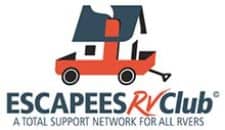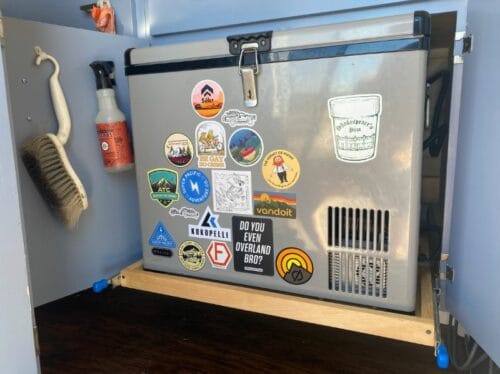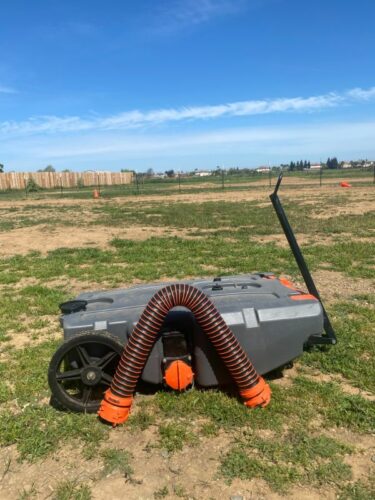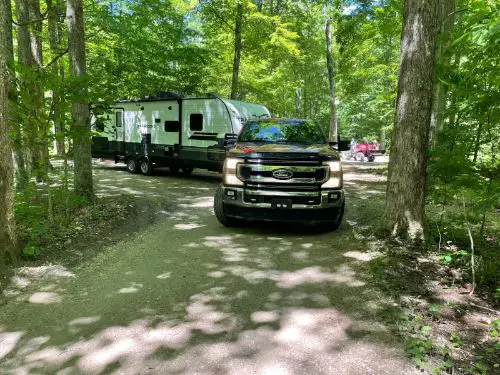If you’re reading this post you’re either new to RVing, or you’ve been thinking seriously about RVing. Either way, you’re likely hearing some conflicting information. You’ve talked to, read about, or lived vicariously through other people who’ve been living the RVing life, yet you just aren’t sure how to separate the facts from the fiction.
That’s where I come in. I am here to bust the RV myths, dispel the RV misconceptions, and either shatter your dreams or build them up. You decide.
1. RVS ARE ONLY FOR RETIREES
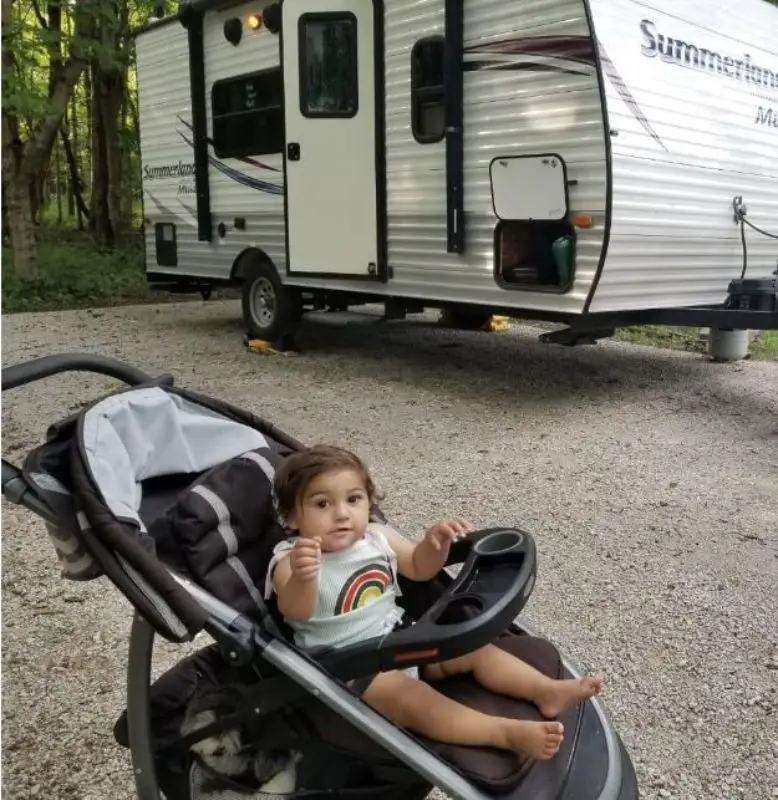
RV’s are undoubtedly popular among retirees. Who wouldn’t want to cruise around and enjoy life wherever the weather is better? Sounds pretty good to you, too, right? That’s because it sounds good to a lot of people, not just old folks and retirees. Of course, if you don’t believe me, surely you’ll believe KOA, the world’s largest system of privately owned campgrounds. In 2017 the KOA North American Camping Report stated pointedly, “Millennials continue to drive growth of camping.” The report went on to say, “In the overall population millennials comprise 31 percent of the adult population, yet account for 38 percent of campers.” (I don’t write it; I just report it, folks!)
Believe me now? Good. Let’s move on.
2. THE RV LIFE IS TOTALLY SPONTANEOUS
Now that you’re all amped up to know you aren’t a fogie if you camp, let’s bring you down a little. I hate to bust this myth because it’s a lie that I still love to tell myself and others. Yes, yes! I can just pack up and go wherever, whenever! And while this is technically true, it’s actually a total lie.
Sorry, but while it’s true that you can literally pack up and go, you had better not dare do it on a whim! You need to plan, man! I mean really plan! You can’t just show up at a campground and haul in there unannounced. Some campgrounds are booked not weeks, not months, but more than a year in advance! So if you don’t plan on boondocking at a different Walmart every night for a week or more, you’d better make a serious plan and a serious backup plan.
So, let’s say you’re still interested, but you can’t seem to find a starting point. Never fear! I’ve got some good news! There are a lot of tools out there to help you. Here are five great resources to help you on your way.
- Reserve America is a web app that helps you find and book campsites across America. Surprising, right? There’s more to it than that, though. This site has guides, points of interest, themed trip routes (think US Barbeque Tour), and tips and tricks for new campers.
- Recreation.gov provides you with the information you need to plan a trip on public property such as US state and federally held land. You can find campgrounds, park fees, and a comprehensive map of the US parks system. Whether you’re looking to dry camp or camp at an inclusive campsite, you can safely start here.
- Campnab scans for cancellations at booked up campgrounds and notifies you when something opens up. There are no guarantees that you’ll get what you’re looking for, but your chances of finding an opening at popular sites are certainly better with campnab.
- Hipcamp is more than a campsite booking tool. Aside from traditional campgrounds, it offers camping access to privately owned land, cottage stays, treehouse camping and so much more. You have options.
- Harvest Hosts is exactly as it sounds. If you’re unenthusiastic about traditional campgrounds, Harvest Hosts pairs you with farms, wineries, and breweries that offer unique camping experiences on privately owned land.
And speaking of planning…
3. IT’S NEVER OKAY TO DRIVE WITH FULL WATER TANKS
Um… How can you dry camp without a water supply? Seriously, how? You can’t. If you’re boondocking, you need your fresh water tank full. Know your GCWR and pack so that you are well below it with your fresh water tank full and your necessities packed before you even think of boondocking.
Your Gross Combined Weight Rating is the maximum weight that both your trailer/camper and the vehicle you’re using to tow it, can safely handle fully loaded. Learn more about it at FCCSA.DOT.gov.
While we’re on the topic of boondocking…
4. BOONDOCKING IS TOTALLY FREE, AND ANYTHING GOES
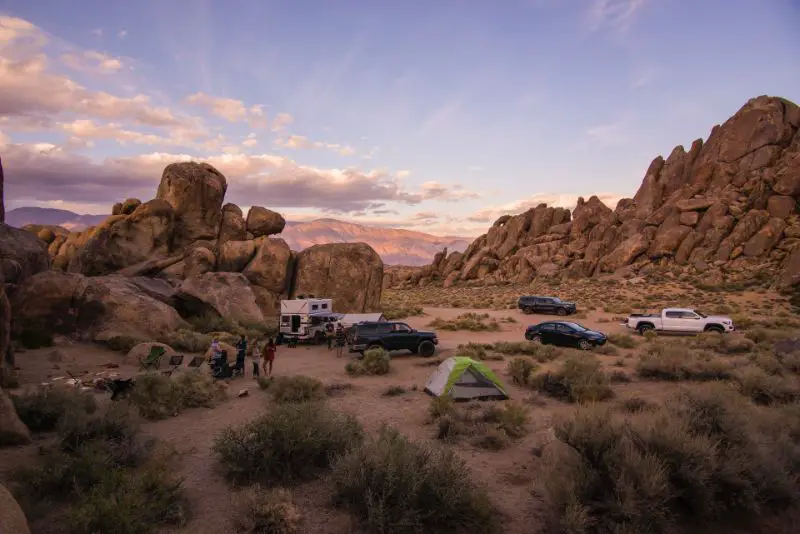
Nope. Just no. If someone has told you this, they are precisely that guy you do not want to be camping near. It’s true that you can dry camp for far less money than staying in campgrounds, but it is by no means free, and yes, there absolutely are rules.
Some examples to prove my points:
- Public land is not always free. Camping on public land will usually run anywhere from $12.00 upto $50 or more per night depending on where you wish to camp. If you plan on staying longer than a night or two, you can usually buy park passes for much less than day/night rates. Always check fees before you go so that you don’t get caught off guard. Best place to start:
- Recreation.gov
- Bureau of Land Management
- You need full water tanks to dry camp, and that’s going to affect your payload (GCWR) and your gas mileage. Gas is not free. Maintenance is not free.
- Paying for pumping is a real thing, especially when you’re not staying at a campground with the convenience of a dump station. Sometimes you have to eat the cost and pump the crap out of your black tank. Fortunately, costs aren’t usually more than $10, but sometimes they are. Need a place to dump, but not sure how or where to find it? Check out rvdumps.com. Now, aren’t you pleased you live in the 21st century!
- Littering is both nasty and illegal. Hiking presents me with a wide variety of animal excrement to avoid. I neither need, nor want, to dodge (or even look at) your baby’s dirty diaper. Or your dirty TP for that matter. I also don’t want to see your empty beer cans and pizza boxes because I don’t have room for beer or pizza in my RV, and it irks me that not only did you fail to share, but you also cluttered up my favorite campsite! I’m sure the conservation officers feel much the same way because littering on public property can stick you for a cool $1k and possibly jail time. It’s better if you just pack up your trash and pay to dump it at a legit dumping station.
- Generators are loud. Really loud. And they don’t just irritate your fellow campers, they disturb wildlife. If you can’t live without your generator running all night, camping, especially in campgrounds, is not for you. Go back to the wired world.
Speaking of the wired world…
5. RVING IS A CHEAP ALTERNATIVE TO RENTING A HOUSE OR AN APARTMENT
Oh, if only this were true! If only! But it’s not. It can be, but it usually isn’t. It totally depends on your camping style.
You might save money if you’re a hardcore boondocker who doesn’t needto be connected, who rarely needs to pump waste, or by some miracle doesn’t need to fill the gas tank with hundreds of dollars worth of gas each month. It also helps to be a forager or a freegan who eats very little and doesn’t need to shower often. And even then, you can forget it if you ever need to make costly, unforeseen repairs. In short, you may come a hair under, or make out just about even, but you are most likely going to spend quite a bit more than your daydreams have led you to believe.
My point? If you’re having trouble paying $850 to $1,500 per month for rent, you need to think long, hard, and seriously before you head to the dealership because a single breakdown can set you back much more than that, and even per-night fees, gas, food, and dumping can easily run you up there. Planning is definitely helpful in keeping costs down, especially if you’re dispersed camping (hardcore boondocking on unconnected public land), but there are never any guarantees. Prices change, things happen, and the best laid plans of mice are probably better than any plan I’ve ever made because let’s face it, mice don’t worry about flat tires, internet dead zones, or other mice chewing on their alternator cables.
Speaking of repairs…
6. NEW RVS ARE BETTER BECAUSE THEY’RE PROTECTED BY THE MANUFACTURER’S WARRANTY
This is a lie you will only ever hear at dealerships and from people who don’t know what they’re talking about. Repeat after me: Dealers want to sell RVs. They will not explain that they will only do repairs on certain days or dates that must be set in advance. Neither will your warranty cover repairs not done at a certified dealership. New RVs are great for a lot of reasons, but if you’re buying new because you want the security of a manufacturer’s warranty, that’s the wrong reason to buy new. Make sure you get all the details of your warranty up front and explained in detail. And don’t forget, you can buy extended warranties from outside brokers as well as dealers. So, shop around. Some places to start:
Now that you know this, let’s talk about another lie closely related to dealerships…
7. IF YOU HAVE A FAMILY, BIGGER IS ALWAYS BETTER
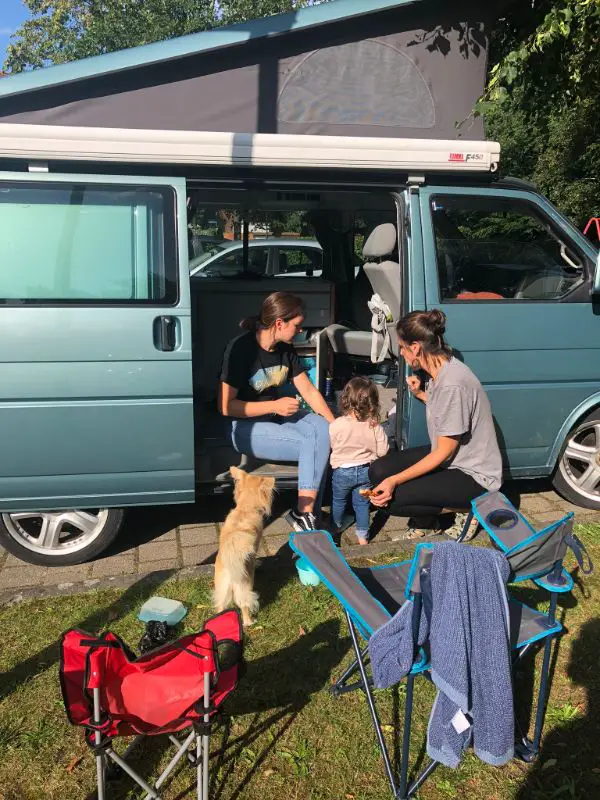
This one sounds totally legit, I know. However, no dealer in his sound mind is going to tell you that this may not be true for your family. No. They will tell you horror stories about people driving around in too-small RVs. The sights, the smells, and the fights! Oh yes, the fights! Don’t be bull-dogged into something you don’t need just because the dealer paints a picture of Clark W. Griswold with your face where Chevy Chase’s face should be. (And if you don’t understand that epic reference, you need to consider Googling just who Clark W. Griswold is. You can thank me later.)
The fact is, you know your family dynamic better than any RV dealer. You know the size of your current home, how well (or not) your kids get along, and if your kids are easily entertained or not. And there are a lot of families out there that travel in less than luxury, and they’re fine. They find ways to keep the kids engaged and involved, they do more driving in the evening so kids can get sleep while covering some distance boredom-free, and they handle situations as they arise. So, before you opt for that tour bus, take a moment to assess whether it’s what your family needs, or what the dealer wants you to think your family needs.
Since we’re on the topic of vacation…
8. EVERY DAY IN YOUR RV IS A VACATION
Hey, hey, hey, you may be on vacation every single day because you love your occupation, but when you live in an RV, you have days like every other. You have to clean, cook, clean, clean, do laundry, pump the nefarious black tank, and do regular checks and routine maintenance. I mean, it’s not all fun and games until someone loses an eye. Or, more probably, forgets to put the side awning up before pulling out of their campsite (which, incidentally could lead to someone losing an eye).
In time you’ll surely get used to the routine of keeping your RV clean and livable inside and out, but it can be pretty overwhelming at first. If you’re looking for tips and tricks that can make it easier, check out KOA’s RV Advice Blog on that very subject! If you don’t like what you read, too bad. C’est la vie!
And while I’m speaking French let’s talk about protection…
9. YOU NEED EXTRA PROTECTION WHEN RVING
By extra protection, I am, of course, referring to guns or other means of personal protection against all the would-be thieves and robbers who will inevitably try to break into your RV and steal your kidneys. (What kind of protection did you think I was talking about?)
So, yeah, that kidney thing, that’s not gonna happen. Nor is a machete-wielding psycho in a hockey mask going to come knocking on your door to borrow a cup of sugar. Your biggest concerns are wild animals if you’re boondocking in the wilderness or party animals if you’re staying at a campground. Neither of these potential hazards will require you to carry a .38 special or a snub-nosed .44.
Not to go on about it, but even having a gun at all could seriously cause you problems if you don’t have the documentation required to carry it, and let’s not forget that you’ll likely be crossing state lines. So, if
you’re afraid of where you’re camping to the point that you think you need a gun, maybe rethink your strategy for picking places to camp. If you’re worried about bears, heavy-duty bear spray will not only deter a bear, it’ll also deter a machete-wielding psycho in a hockey mask. (He’ll not be begging off your sugar again any time soon! Ha!)
And all this talk of party animals reminds me of another shattered dream…
10. RV CAMPING IS ALWAYS PEACEFUL
This truly breaks my heart to tell you, but sometimes, oftentimes, campgrounds are just not peaceful. While it’s an exaggeration to say they’re all full of party animals, they are full of human animals. Humans are social creatures, and every campsite (yes I meant to say campsite) has its own unique culture.
- You have the get-off-my-lawn! types who now guard their personal campsites with the same vigor that they had guarded their curated lawns way back in Delewherever.
- You have the families who only RV in the summer, and they look as lost as your cell-phone signal in Wyoming. You also have the younger work-on-the-run nomad types
Every campground sports a broad demographic, and each campsite represents only a fraction of it. This means you may hear music, children playing loudly, spouses fighting, or generators running far too late into the evening. Boondocking is usually more peaceful. Key word, usually. Not always, but usually.
About that family who looked as lost as your cell phone signal in Wyoming … they must have believed the following lie.
11. GOOGLE MAPS IS ALL YOU NEED
If you’re in a car, Google is likely your best friend, but RVs are not cars. You need more than Google. You need an RV-specific GPS system. RV-specific GPS makes trips smoother because you can easily plan around low bypasses and narrow roads. This is something you can’t do with Google Maps. Here are a few systems you might check out:
- Garmin RV 780 GPS Navigator
- Rand McNally OverDryve 7 RV GPS Device
- inRoute Smartphone App (smartphone apps may not be as reliable in remote locations due to signal disruptions.)
All that having been said, Google Maps isn’t entirely useless. Google Street View and Satellite View are both fantastic tools to help you get a look at your campground entrances as well as a bird’s eye view of the campground itself. These two things make keeping Google on hand worth it, but don’t rely solely on Google to get you where you want to go.
And speaking of things to keep on hand…
12. IF YOU HAVE GOOD GPS, YOU DON’T NEED PAPER MAPS
Whoever tells you this deserves to be ignored. It doesn’t matter if you’re an RV newbie or a long-time RV junky, paper maps matter. Phone signal gets lost, devices malfunction. These are facts. No one, especially not someone new to RVing, wants to end up lost in the boondocks with rapidly dwindling fuel and a full black water tank!
Paper maps still exist because they are still useful. You may not need them often, but the day you do, you won’t be cursing the fool who told you to leave them behind, or yourself for listening to him (or her), because you read this article beforehand! So never skip the paper maps! Without them, you may never know where there be monsters!

Azaliah Yadinah
Born and raised in Detroit, now a resident of Kansas City, Azaliah is an experienced author who specializes in creative nonfiction: articles, satirical pieces, short stories, novels, and blogs. She’s got a wicked sense of humor and loves to travel!



